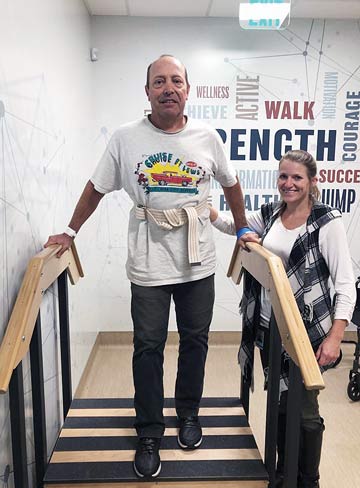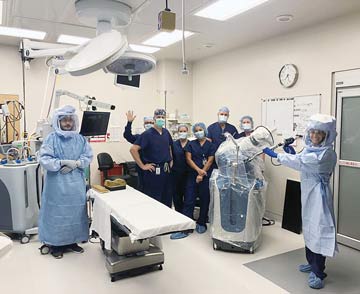The Oregon Surgical Institute (OSI) is on pace to complete its 500th outpatient joint replacement of the year next month. Patients are ready to head home 6 hours after they walk into the facility in Beaverton, Ore., because staff know how to run an efficient, successful program that's growing right along with the same-day joints market. OSI's staff and surgeons got the program to where it is today because of their commitment, dedication and hard work, but the facility also received some major help along the way from a consulting program offered through an orthopedic equipment vendor. As the outpatient joints market continues to surge, an increasing number of the major players in the implant and instrument space are offering consulting help to facilities that need assistance launching or streamlining their programs. A vendor-run consulting program can serve as an invaluable resource if you're looking to launch, retool or even rebrand your facility's total joints program.
- Home
- The Magazine
- Article
Teachers of Total Joints
By: Jared Bilski
Published: 11/14/2019
Consulting services can help you start from scratch or push your program to the next level of success.
From the ground up
OSI's consulting program was instrumental in helping the facility launch a total joints program from scratch. It was a 9-month process involving 5 on-site consultant visits (and some late-night meetings) as well as constant phone and email communication. The consultant was a physical therapist, which helped ease some of the initial concerns OSI staff had about getting practical, hands-on advice through the program. "It was extremely meaningful to know that there was another clinical person working with me on this, that is wasn't just a salesperson," says Sarah Roberts, RN, the total joints orthopedic coordinator for OSI.
The facility got a lot out of the program, including a standardization of the physicians' selection criteria and protocols, and a patient-tracking and customizable education template for OSI to build a standardized program around. That first part is key to the success of any total joints program because if you want to operate efficiently, there's a certain level of standardization your surgeons will need to agree to. Let's be honest, that can be challenging. That's where the consultant really showed her worth.
"The reason our program works is because the surgeons, who come from competing programs, sat down together and agreed on the key aspects of our protocols," says Ms. Roberts. "The consultant was integral in putting our physicians in a room and getting them to compromise on certain things."

For example, they had to agree on the exclusion criteria (poorly controlled diabetes, cardiac disease) as well as protocols for things like anticoagulation and wound closure. The consultant also helped to mediate intense discussions about where the facility needed to draw the line about acceptable comorbidities. "There was a lot of discussion among our surgeons about medications they wanted to use and use of local anesthetics," says Carla Daley, RN, BSN, the senior director of clinical operations for Regent Surgical Health, an Illinois-based ASC management firm that is a partner with OSI. The total joints consultant was there to steer these discussions in a productive way.
The consulting program was also instrumental in helping OSI with data collection and patient education through a customizable engagement app that was available to patients free of charge. "They had a template of a program that we went through line by line, and worked out all of the kinks," says Ms. Roberts. The facility begins communicating with patients through the app 30 days before scheduled procedures. One of the first questions candidates for surgery are asked is, Are you a smoker? If they answer yes, the app automatically sends OSI's care team an alert, so they can immediately discuss smoking-cessation strategies with the patient.
Ultimately, the success of starting a new outpatient total joints program is going to rest on your staff's shoulders, but consultants can help you bring all the pieces together during that critical, often-chaotic early phase of the launch. "We were lucky to work with someone who had a lot of expertise and who was able to give us that outside perspective on what would and wouldn't work in an objective way," says Ms. Daley.
From good to great
Consulting services are valuable resources if you already have a successful total joints program in place, but could use some help with the logistics of things like inventory management and patient flow. Such was the case for Orthopedic ONE, an orthopedic-only specialty center in Columbus, Ohio, that has done thousands of total joints, had only 2 total joint patients stay overnight and has an infection rate of less than 0.1%.
"Our consultant did a lot for us in terms of managing the behind the scenes workflow of surgery," says Joel Politi, MD, the managing partner of Orthopedic ONE. That included analyzing and taking inventory of the specialized instruments trays — things like specific hip- and knee retractors, rongeurs and pickups — and organizing and consolidating everything in the most efficient way possible. "The consultants helped us streamline how we set up our special trays and pick sheets, and helped us to get a handle on the inventory of what instruments we were using in other places of our facility," says Dr. Politi.
That type of logistical assistance can go a long way, especially if you're a high-volume ASC with limited sterile processing capabilities. "On any given day, I could do 10 total joints, that's 5 or 6 trays for implants and prep, plus all of our special instrument needs," says Dr. Politi. "We run all those items through sterile processing, and we don't run short on anything."
He credits the logistical help his facility has received from its consultant for this level of efficiency.
Building the business

In addition to helping you start or streamline a total joints program, vendors should be able to help market your facility as a go-to destination. This is something St. Cloud (Minn.) Surgical Center learned simply by looking for new, value-added opportunities from its vendor.
When St. Cloud launched its outpatient total joints program in 2014, orthro vendors didn't offer the types of consulting options they do today. In the 5 years since, St. Cloud has replaced some 1,200 joints — and found ways to get more from its major equipment and implant supplier. "Our vendor will sometimes help pay the cost of a patient education seminar," says Darci Nagorski, St. Cloud's administrator and CEO. "It's not a lot, but if it can help defray some of our costs, that helps our program."
The vendor will also supply seminar attendees with some of the printed educational materials they take home from the seminars. While marketing help from an ortho vendor can certainly help your facility, Ms. Nagorski urges facilities to use caution because there are rules and regulations governing what you can and can't do with your vendors in terms of marketing. "You'll need to sit down with compliance or your facility's legal representation to make sure nothing runs afoul of the Stark Law or anti-kickback regulations, as those laws relate to marketing or inducements for referrals," says Ms. Nagorski. If you're partnering with vendors for educational seminars, keep meticulous documentation of your spending, she adds.
Even if you can't get a vendor consultant to directly help with your marketing costs, you can leverage the resources they have at their disposal. "Larger companies might be able to offer you detailed market-share information on things such as people with arthritis within your market as well as the best mediums to reach these individuals," says Ms. Nagorski.
With this data, you can work with your vendor to market to individuals who have arthritis and are likely to need a joint replacement in the near future so that, when the time comes, they'll seek out your facility, says Ms. Nagorski.
Ms. Nagorski suggests you sit down with your vendors and ask them point blank how they can add value to your facility.
"Companies should be willing to put some skin in the game to be your partner, not just your vendor, because they're incentivized to help you grow," Ms. Nagorski says. "Ask about outside-the-box options they can offer to help you grow your market share."
From helping your surgeons standardize protocols to streamlining the logistics of your program and much more, here are some of the total joints consulting programs top orthopedic vendors are offering:
- Accelero (a subsidiary of Zimmer Biomet) offers Outpatient Joint Advantage, a service that helps facilities manage the entire episode of care, improve operational efficiencies, boost patient satisfaction and conduct local marketing (osmag.net/xHG7pM).
- DePuy Synthes provides national and regional support programs, on-site consultation visits, online educational content and a pathway to follow for launching a program (osmag.net/D7zHDa).
- Smith & Nephew's new Outpatient Joint Experience Team Training program provides peer-to-peer coaching for surgeons and anesthesiologists, advice for optimizing patient selection, ways to improve team communication and data collection, patient engagement and education offerings, marketing training and solutions for maximizing OR efficiencies (osmag.net/N8EsJt).
Arthrex partners with facilities interested in learning how to better manage patient selection and education, equipment planning, pre- and post-op care, and payer contracts (osmag.net/uCa6GW).
In for the long haul
Ultimately, you want to partner with a program that can provide you services at the beginning, middle and end of your program's process, says Dr. Politi. "Total joints is an evolving art," he adds. "What's happening two or three years ago is not what's going to be happening in two or three years. Growing with a knowledgeable, active consultant can prove to be invaluable." OSM
.svg?sfvrsn=be606e78_3)
.svg?sfvrsn=56b2f850_5)